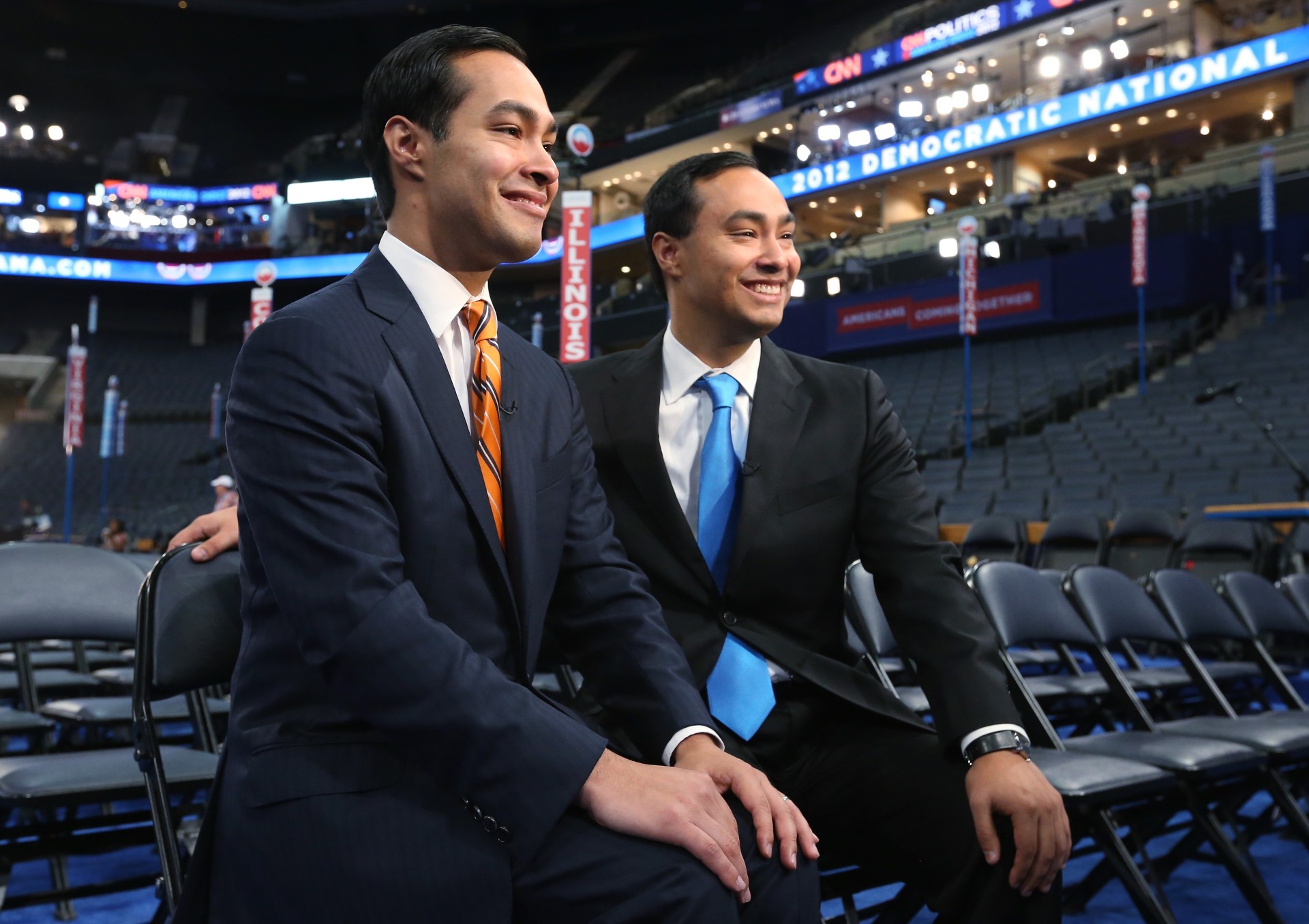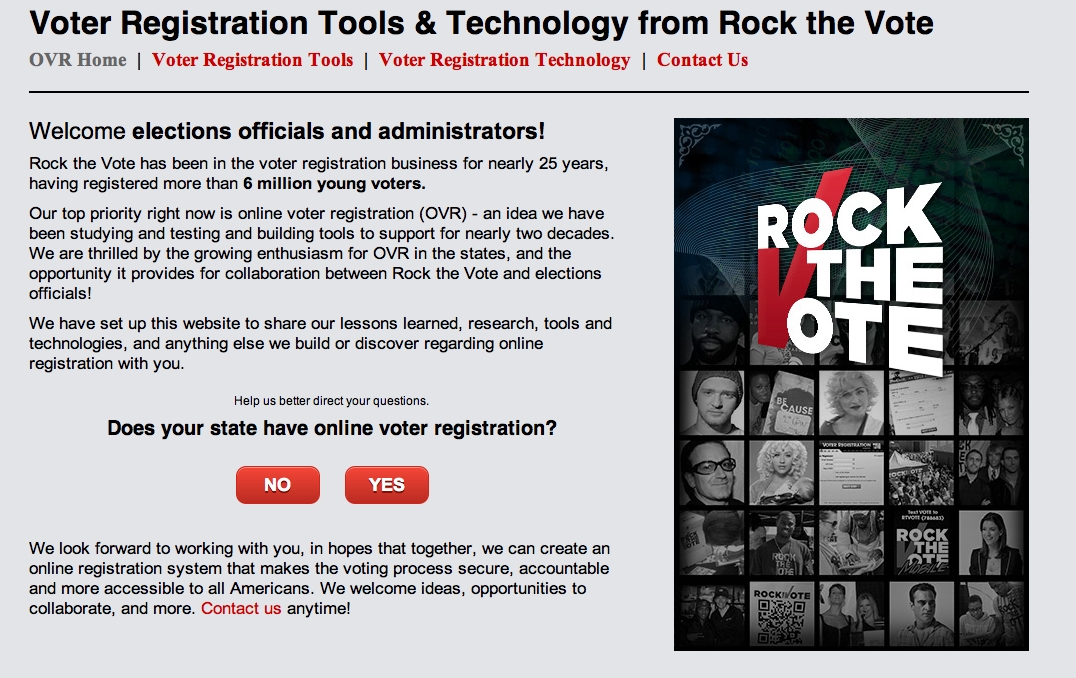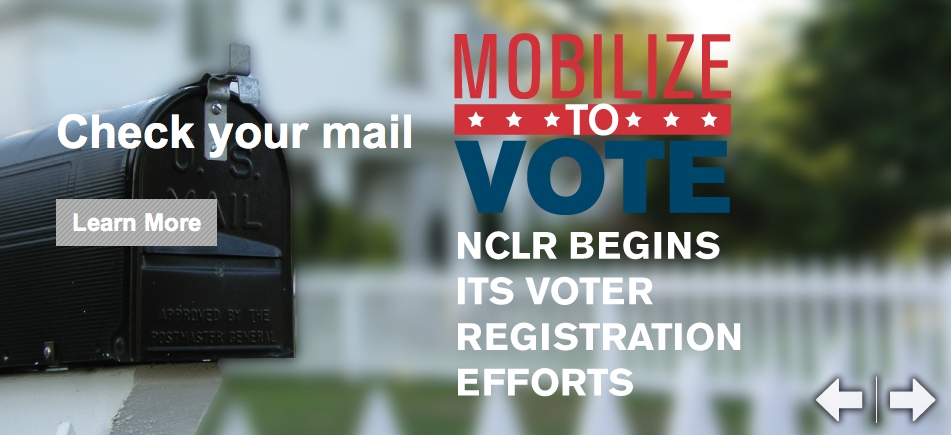Advocacy Groups Target Latinos, Youth 10 Months Ahead of Midterm Elections
By EMILY DERUY – 01/28/2014, 10:06AM / Updated 01/28/2014, 11:08AM
Advocacy organizations are urging Latinos and young people to break tradition and vote during the midterm elections come November.
The two groups need some convincing right now though, because lawmakers haven’t given them many reasons to believe their vote matters. Hispanics, who rallied behind immigration reform, have been largely disappointed by the lack of progress on the issue. And few politicians, who know young people aren’t the most reliable voters, don’t spend time campaigning for their attention.
A pre-midterms push to register skeptical voters
But groups like the National Council of La Raza(NCLR) and Rock the Vote are intent on changing the voting gap. They argue that if Latinos and young people did vote at higher rates, their voices would matter. Turnout is lower at midterms and those who do show up can have a real impact. Tea Party voters, spurred to action by intense anger at the Wall Street bailout and what they saw as government meddling in things like healthcare, turned out for the 2010 midterms and swept many Tea Party candidates into office. That shift hascontributed heavily to a slew of abortion restrictions in the past several years.
NCLR, the nation’s largest Latino advocacy organization, working with Mi Familia Vota Education Fund, a civic engagement organization, just launched a $5 million effort to reach around two and a half million potential voters in the coming months. Their goal is to get 250,000 of the Latinos they reach registered and to the polls for the midterms.
Clarissa Martínez-De-Castro, director of civic engagement and immigration for NCLR, told reporters during a recent news conference to announce the initiative that the “story” of how the Latino vote matters at the local and state levels, particularly during midterms “is sometimes lost.” She pointed out that if they turn out, Latinos can exert influence in places like Oregon and New Hampshire beyond where they have traditionally been concentrated.
She acknowledged though, that Latinos are “skeptical” about their ability to influence the electoral process.
The National Council of La Raza and Mi Familia Vota hope to encourage several hundred thousand Latinos to register and vote in the 2014 midterm elections with a new outreach campaign.
Snail mail wins out
So how do these organizations plan to compel people to vote in the midterms?
Martínez-De-Castro said her organization would be “testing new methods” for closing the “participation gap” between Hispanics and non-minority voters, who tend to vote at higher rates, particularly in midterm elections.
They plan to do that by sending registration information by mail and by following up with phone calls. They are concentrating their registration efforts in the Southwest because that is where the Latino population is growing rapidly.
Data suggests that from now to around 2028, nearly a million Latinos will reach voting age each year. NCLR and Mi Familia Vota are hoping that by reaching out early, more than half a year before the midterms, they will give people enough time to fill out and send in their registration forms.
When Fusion asked whether, given the relative youth of the population, there would be social media efforts or text messaging, Martínez-De-Castro said the organization thinks it will be most effective to get registration information into people’s hands by mail. Most states still require people to mail in a paper form and giving potential voters the actual form instead of directing them to a site where they would need to print it might be more effective.
Approximately 8.6 million Latinos in the United States are eligible to vote but have not yet registered. Part of that has to do with the fact that Latinos are a relatively young population and young people are less likely to cast ballots.
Gary Segura, a Stanford University professor and co-founder of political opinion research firm Latino Decisions said during the news conference that Latinos aren’t as inspired to turn out by partisan outreach from Republicans or Democrats the way some other demographics are. Instead, he said, they turn out when they feel the Hispanic community has a stake, and that they have the ability to effect real change, in an election.
Familiar faces mean higher turnout
The Latino Victory Project, which was founded by Henry Muñoz and Eva Longoria to encourage Latinos to engage in the electoral process, is promoting a different approach.
Cristóbal Alex, president of Latino Victory Project, said during a recent phone interview that getting people out to vote is important, but it’s also important to give them a candidate they can relate to and support. They’re encouraging Latinos to run for office, partially in the hope that it will drive more Latinos to the polls.
“When you don’t see people who sound like you, look like you and have the same names,” Alex said, “you’re less likely to vote.”

San Antonio Mayor Julian Castro (L) and his brother State Rep. Joaquin Castro (D-TX) give an interview during preparations for the Democratic National Convention at Time Warner Cable Arena on September 3, 2012 in Charlotte, North Carolina.
People like the Castro brothers, Alex said, referring to San Antonio Mayor Julian Castro and U.S. Rep. Joaquín Castro (D-Tex.), “lead the way for Latino youth.”
The organization is especially interested in hooking young voters so that they develop a habit of civic engagement early on. The group has relied on Longoria’s celebrity status to garner interest.
But getting Latinos to the polls isn’t simply an issue of overcoming a lack of interest. Hispanics are more likely than non-minorities to have less flexible job schedules and to lack transportation, which can make voting a logistical nightmare.
That’s part of the reason groups like NCLR are concerned about the recent Supreme Court ruling that in effect lets states that used to need permission from the government, change their voting laws. Some states, like Wisconsin, have tried to limit early voting or no-excuse absentee voting, which can be crucial for getting Latinos to vote. Income and education level are also predictors of turnout and Latinos have relatively low levels of both compared to other demographics. New voters may also not be familiar with how the voting process works.
Online is the place to be
Rock the Vote is trying to reach out to young people who fall into that latter category by focusing on online registration.
Heather Smith, president of the organization, said during a recent phone interview with Fusion that one reason young people tend to vote at lower rates is not that they don’t care, but that they don’t understand how the process works and no one has done a good job of reaching out and explaining it. Not many know that they can find information on a secretary of state website, for instance.
“We’ve stopped teaching civics in high school,” Smith said, “and if you’re in a community where your parents don’t vote…you’re not born knowing how this process works.”

Rock the Vote is encouraging election officials to consider online voter registration forms.
The organization has found that “across all subsets [of young people], one thing remains true and that is they’re all going online.”
That’s particularly true for Latino youth, who actually over-index when it comes to smartphone usage. Rock the Vote has tried to take advantage of that by putting voter registration forms in apps. People still need to print, sign the forms and mail them in because, as Smith said, most states “still operate in an antiquated paper-based voter registration process,” but she’s hopeful that will soon change.
A presidential commission, formed after long lines and voter ID issues plagued the 2012 elections, recently released recommendations that tout the benefits of online registration. Smith and Rock the Vote worked closely with the commission and Smith was pleasantly surprised that the recommendations didn’t just address long lines, but recognized that “lines and other problems are caused by the voter registration process.”
“If it’s implemented, I think it will expand the voter registration process,” Smith said. “It will save a tremendous amount of money for election administrators and it will make the overall voting process much more efficient.”
She’d also like to see more early voting, especially at campus polling places, and no-excuse absentee options.
Smith added that, compared to previous midterms, the millennial generation is “so big” that even “just a point or two” increase in turnout could have an impact in a number of congressional districts.
